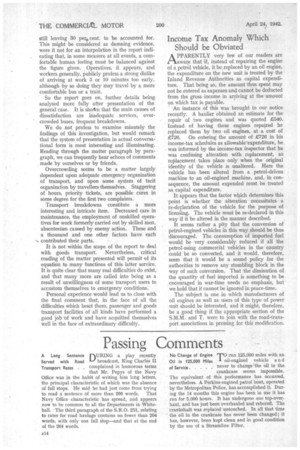Income Tax Anomaly Which Should be Obviated
Page 16

If you've noticed an error in this article please click here to report it so we can fix it.
A PPARENTLY very few of our readers are ..aware that if, instead• of repairing the engine of a petrol vehicle, it be replaced by an oil engine, the expenditure on the new unit is treated by the Inland Revenue Authorities as capital expenditure. That being so, the amount thus spent may not be entered as expenses and cannot be deducted from the gross income in arriving at the amount on which tax is payable.
An instance of this was brought to our notice recently. A haulier obtained an estimate for the repair of two engines and was quoted £540. Instead of having these engines repaired he replaced them by two oil engines, at a cost of £726. On entering the amount of £726 in his income-tax schedules as allowable expenditure, he was informed by the income-tax inspector that he was confusing alteration with replacement, as replacement takes place only when the original identity of the vehicle is unaltered. Here the vehicle has been altered from a petrol-driven machine to an oil-engined machine, and, in consequence, the amount expended must be treated as capital expenditure.
It appears that the factor which determines this point is whether the alteration necessitates a re-declaration of the vehicle for the purpose of licensing. The vehicle must be re-declared in this way if it be altered in the manner described.
It seems rather a pity that the conversion of petrol-engined vehicles in this way should be thus discouraged. The consumption of imported fuel would be very considerably reduced if all the petrol-using commercial vehicles in the country could be so converted, and it would, therefore, seem that it would be a sound policy for the authorities to remove any stumbling block in the way of such conversion. That the diminution of the quantity of fuel imported is something to be encouraged in war-time needs no emphasis, but we hold that it cannot be ignored in peace-time.
The subject is one in which manufacturers of oil engines as well as users of this type of power unit should be interested, and it might, therefore, be a good thing if the appropriate section of the S.M.M. and T. were to join with the road-transport associations in pressing for this modification.




















































